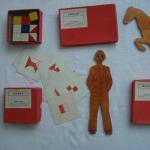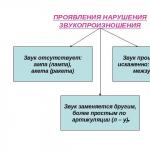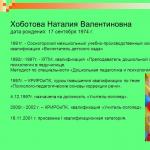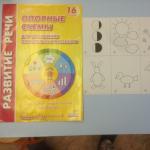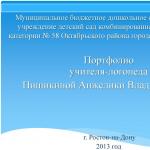Portfolio of speech therapist Myznikova L.A. "My achievements
PORTFOLIO
MYZNIKOVA LYUDMILA ALEKSANDROVNA
TEACHER-SPEECH Therapist
GOU TO "KIREEVSKAYA SCHOOL FOR ORPHANS AND CHILDREN LEFT WITHOUT PARENTAL CARE"
| INFORMATION CARD |
||
| FULL NAME. | Myznikova Ludmila Alexandrovna |
|
| Place of work | GOU TO "Kireevskaya school for orphans and children left without parental care" |
|
| Job title | Teacher speech therapist |
|
| pedstage | 20 years |
|
| Education | Higher |
|
| Classes | 1-6 grades |
|
| Awards, thanks | 2003 Administration of the Tula Region Department of Education. Honorary Diploma, regional level. 2006 Department of Education of the Tula Region. Honorary Diploma, regional level. 2015 Ministry of Education and Science of the Russian Federation. Honorary diploma, all-Russian level. 2016 Gratitude of the administration of the MCUDO "Center for Psychological, Pedagogical and Social Assistance", municipal level. 2017 Gratitude from the administration of the GOU TO "Kireevskaya school for orphans and children left without parental care", the level of the educational institution. |
|
| Personal site | ||
TRAINING
| Availability of coursework | 2012 GOU DPO TO "Institute for advanced training and professional retraining of educators in the Tula region." Theory and methodology of correctional work with children with disabilities. 72 hours 2012 FSBEI HPE "Tula State Pedagogical University. L.N. Tolstoy". ICT in professional activity. 94 hours 2015 Autonomous non-profit organization DPO "Innovative educational center for advanced training and retraining" My University ". Health-saving educational technologies in the context of the implementation of the Federal State Educational Standard. 72 hours |
| Certification | Confirmation of the highest qualification category in November 2016 |
EFFICIENT ORGANIZATION OF THE EDUCATIONAL PROCESS
| Efficiency of mastering correctional and developmental programs by students | 2011-2012 academic year | 2012-2013 academic year | 2013-2014 academic year | 2014-2015 academic year | 2015-2016 academic year |
||
| Total number of students | 23 people | 26 people | 27 people | 26 people | 31 people |
||
| Number of students with positive learning outcomes | 23 (100%) | 26 (100%) | 27 (100%) | 26 (100%) | 31 (100%) |
||
| Number of students with unsatisfactory dynamics | |||||||
| The results of the graduates of the speech center(the number of students who are in time for "4" and "5" in the Russian language) | 65% | 65% | 72% | 76% | 85% |
||
| Participation of students in olympiads, competitions | 2015PEDOLIMPInternational Pedagogical Creative Olympiad "Project and Research Activities (Primary School)", project "Selected Works", Kirsanova E., Panova R., Semenikhin A., Shagaev V., Yuzhakov E., winners (1st place), international level. 2016 All-Russian Blitz Olympiad for preschoolers and primary school students "School Supplies", Chumachenko Stepan, 2nd place, All-Russian level. |
||||||
| Used pedagogical technologies Gaming technologies TRIZ (theory of inventive problem solving) Problem learning Modular learning Project method AMO (active learning methods) Reflective Technologies Kinesiology Health saving technologies Resulting scoring technology Work on self-regulation, rehabilitation of aggressiveness and increasing motivation for learning with the help of sensory room resources Neuropsychological diagnostic technologies Technology of differentiated learning ICT technologies: Computer module "Family Mentor" Computer modules "Games for Tigers", "Delfa-142" ProgramWordwithin the framework of the long-term project “Selected Works” ProgramPOint ProgramPowerPoint Computer stands “Wildlife. Plants”, “Wildlife. Animals" Personal site http://myuznikova.ucoz.com/ Extracurricular activities with students | Goals: Reduced fatigue during exercise; Maintaining interest in the work in the classroom; Motivation for vigorous activity; Formation of the ability to work according to the rules; Formation of skills of conflict-free interaction with peers and adults; Formation of adequate self-esteem. Goals: the formation of mental activity in interaction with the development of speech (mental activity, visualization of forms of thinking, mental operations); development of mental abilities through mastering the actions of visual modeling; development of creative abilities; formation of abilities for volitional efforts, arbitrary regulation of behavior; overcoming the negative qualities of the emerging character. Goals: Development of intelligence; Formation of cognitive independence; Development of creative abilities; Formation of ways of mental practical activity; Optimization of the learning process. Formation of skills: Goals: Development of the ability to generalize, compare and edit the collected material. The development of written speech through the use of expressive means of language, ICT. Formation of general educational skills and abilities (reflexive, search, communication, presentation skills). The development of independence, the ability to plan their activities, value their time. Goals: formation of positive educational motivation increasing the cognitive activity of students, the active involvement of students in the educational process stimulation of independent activity development of cognitive processes - speech, memory, thinking, effective assimilation of a large amount of educational information development of creative abilities and non-standard thinking development of the communicative-emotional sphere of personality revealing the personal and individual capabilities of each student and determining the conditions for their manifestation and development development of skills of independent mental work, development of universal skills. Target: Formation of the ability to understand the reasons for success or failure in educational activities and the ability to act constructively even in situations of failure. Goals: Development of interhemispheric specialization; Development of interhemispheric interaction; Development of interhemispheric connections; Synchronization of the hemispheres; Development of fine motor skills; Development of abilities; Development of memory, attention; Development of speech; Development of thinking; Elimination of dyslexia. Goals: Creation of conditions for self-expression of students; Initiation of various activities; The use of techniques that contribute to the manifestation and preservation of interest in the subject; Creating a favorable psychological climate in the classroom; Prevention of hypodynamia Target: It introduces an element of competition and allows each student to contribute to the class score box with the help of knowledge in the subject. 1 block. Increasing motivation to conduct speech therapy diagnostics, to corrective and developmental classes. Target: Increasing motivation for the diagnostic procedure; To increase the efficiency of adaptation of an orphan child to new conditions; Removal of stress tension; Enriching the child's vocabulary with new concepts; Increasing efficiency; Establishing trusting relationships. 2 block. Work on self-regulation in the sensory room. Target: Creation of conditions for relieving muscle and mental tension; Development of the ability to regulate one's mood, state, degree of fatigue and behavior; Teach methods of self-education; Encourage healthy lifestyle; Increasing self-confidence; Formation of adequate self-esteem; Decrease in the level of anxiety. 3 block. Rehabilitation of aggressiveness and abnormal behavior. Target: Help the child to get rid of negative emotions using the conditions of the sensory room; To ensure the correct psychological approach to this category of children; Prevention of fears, misunderstandings in relationships with adults and peers, violations of the educational process due to a violation of the discipline of an aggressive child; Achieving an integrated approach to adapting to new living conditions of the life of orphans with aggressiveness. Target: Development of diagnostic programs that allow more accurate differentiation of oral and written speech disorders in younger schoolchildren and adolescents with various concomitant diagnoses (pedagogical neglect, MMD, ADHD, mental retardation, etc.), which contributes to a more productive correction of existing disorders, taking into account the individual capabilities of the child . Target: Allows for a full-scale correction of similar speech disorders in children, based on the level of speech development, and involves programs and tasks of varying complexity. Goals: initial and clarifying diagnosis of gaps in knowledge; elimination of knowledge gaps among pedagogically neglected students; formation of skills of independent work and self-control; formation of adequate self-esteem. Goals: correction of incorrect sound pronunciation; the formation of phonemic hearing; correction of lexical and grammatical insufficiency Goals: development of sound-letter analysis; formation of coherent speech; elimination of lexical and grammatical insufficiency; development of spelling vigilance; Goals: optimization of the learning process; development of visual-spatial gnosis and praxis; formation of color perception; diagnosis of the emotional state of the child Goals: optimization of the correctional and developmental process with the help of multimedia presentations and computer games developed within the framework of this program; development of visual-spatial gnosis and praxis Goals: Development of vocabulary and general awareness; Development of attention; Development of perception; Memory development; Imagination development; Development of perception of spatial relationships; Development of arbitrary self-regulation of behavior. Goals: optimization of the correctional and educational process; involvement of students in the process of self-education by completing additional tasks posted on the website; encouraging students by publishing their achievements on the site. Long-term school-wide project "Selected Works" (implemented since 2012) (grades 3-6). Subject weeks of the escort service "Positive Week" (annually since 2012) (all-school event). Ball of good and excellent students. Tea party (annually since 2014) (school-wide event). 2014 Holiday "Day of Humor" (school-wide event). 2015 Holiday "Rainbow in your hands" (elementary school). 2017 Action "History of my surname" (all-school event). |
||||||
| EDUCATIONAL ACTIVITIES |
|||||||
| Educational work to promote and form students' skills and habits of a healthy lifestyle PARTICIPATION IN INNOVATION ACTIVITIES Development of programs, diagnostic methods, teaching aids Publications of works on Internet resources | Introduction of the basics of a healthy lifestyle into the subject of the Selected Essays project (adding essays on topics to children's books): Computer: good or bad? An unusual trip to the country of chips and crackers. Amazing transformations of the spikelet. This is amazing milk. What do you need to do to grow up healthy? Classes in the rehabilitation room in order to form a positive attitude towards educational activities according to the approved schedule; Classes in the sensory room in order to relieve emotional stress, correct aggressiveness, negative manifestations of learning, reduce the level of anxiety; Conducting classes on topics: 2012 Culinary Journey (Grade 2) 2012 Computer. Good or bad? (3 cells) 2013 Daily routine - the basis of human life (1 cl.) 2014 Holiday "Day of Humor. Laughter heals the soul ”(school-wide event) 2015 Ball of good and excellent students. Tea drinking "Healing properties of tea" (school-wide event) 2015 Holiday in the 1st grade using the technology of body art "Rainbow in your hands" 2016 Integrated speech therapy lesson “Differentiation of S-C. Birds. Preparing Beetroot Salad » *Speech therapy support program for students with impaired oral and written speech (grades 1-7), municipal level * Program for the development of intellectual abilities of younger students using the resources of computer stands "Wildlife", the level of an educational institution * Developmental program "The fontanel of my speech" as part of speech therapy support, the level of an educational institution *Health saving program in speech therapy classes, level of educational institution *The program for the correction of severe speech disorders in primary school students, the level of the educational institution Diagnostic methods: *Protocol of neuropsychological examination of speech, level of educational institution * Diagnostics of the speech sphere of older students, the level of the educational institution *Diagnostic complex for identifying the features of the motor-rhythmic sphere of stuttering junior schoolchildren, all-Russian level (publication in the media) *Diagnostic tools for studying the level of formation of phonemic perception in children of senior preschool and primary school age, all-Russian level (publication in the media) *Diagnostic method for studying the level of speech development of orphans of primary school age, the level of the educational institution Methodological aids: *Puzzles for children of senior preschool and primary school age, all-Russian level (publication in the media) *The system of games and exercises for the correction of oral and written speech, the level of the educational institution *Notebook for work on the correction of dysgraphia, the level of the educational institution *Computer game "Museum of Samovars", the level of an educational institution *Computer game "Pick up the word scheme", the level of the educational institution *Computer game "What's what?", the level of the educational institution *Computer game "Whose cub?", educational institution level *Computer game "Journey of Winnie the Pooh and Piglet through the country of Morphology", the level of an educational institution *Presentation for the program for the correction of mixed dysgraphia (1 year of study) - 37 pcs., the level of the educational institution *Presentation for the program for the correction of mixed dysgraphia (2nd year of study)—28 pcs., the level of the educational institution *Presentation for the program for the development of coherent speech in children with ONR(III) Grade 1—12 pcs., the level of an educational institution *Presentation to the program for the correction of OHP(I)—12 pcs., the level of the educational institution *Presentation for individual lessons on the correction of sound pronunciation—5 pcs., the level of the educational institution *Presentation for reports, conferences, seminars, holidays, school-wide events - 15 pcs., the level of the educational institution http://lumuza.pedgazeta.ru/ http://lumuza.pedmir.ru/ *Personal site-http://myuznikova.ucoz.com/ *Pages on the personal website: "Speech therapy technologies", "Synopsis of speech therapy classes", "Diagnostic techniques", "Speechless children", "Methodological material", "Documentation. Design Recommendations » 2013 Diagnostic complex for identifying the features of the motor-rhythmic sphere of stuttering younger schoolchildren. "Pedagogical newspaper", all-Russian level http://pedgazeta.ru/ 2013 Diagnostic tools for studying the level of formation of phonemic perception in children of senior preschool and primary school age. "Pedagogical World", All-Russian level http://pedmir.ru/ 2013 The composition of the word (summary of a speech therapy lesson using ICT). "Pedagogical newspaper", all-Russian level http://pedgazeta.ru/ 2013 The expediency of using ICT in speech therapy classes. "Pedagogical newspaper", all-Russian level http://pedgazeta.ru/ 2013 Synopsis of a speech therapy lesson in grades 5-6 for children with lexical and grammatical insufficiency and pedagogical neglect using ICT. Murzilka against Yabeda-Koryabeda. Differentiation of related and unrelated words (based on the work of A. Semyonov "The Twelve Agents of Yabeda-Koryabeda"). "Pedagogical World", All-Russian level http://pedmir.ru/ 2014 Puzzles for children of senior preschool and primary school age. "Pedagogical newspaper", all-Russian level http://pedgazeta.ru/ 2014 Kinesiology in speech therapy classes. "Pedagogical World", All-Russian level http://pedmir.ru/ 2015 Synopsis of a speech therapy lesson on dysgraphia correction in grade 2 “Journey to the Emerald City. Differentiation D-T. "Pedagogical World", All-Russian level http://pedmir.ru/ 2015 Project "Selected Works".PEDOLIMP 2015 Antonyms. Phraseologisms-antonyms (summary of a speech therapy lesson on the correction of mixed dysgraphia). "Pedagogical newspaper", all-Russian level http://pedgazeta.ru/ 2015 Abstract of an individual speech therapy session with a disabled child in a rehabilitation room. Differentiation L-L.PEDOLIMP, international level http://pedolimp.ru/ 2014 Generalization of experience on the topic "ICT in speech therapy classes", article "Expediency of using ICT in speech therapy classes", "Pedagogical newspaper"http://pedgazeta.ru/, personal website http://myuznikova.ucoz.com/ 2016 Generalization of experience on the topic "Health-saving technologies in correctional and developmental activities", article "Speech therapy technologies", personal website http://myuznikova.ucoz.com/ ; article "Kinesiology in speech therapy classes" magazine"Pedagogical world" http://pedmir.ru/ |
||||||
| PARTICIPATION IN METHODOLOGICAL WORK Speech at teachers' councils, seminars, methodical associations Open lessons, master classes Generalization of experience Participation in competitions | 2014 MKUDO "Center for Psychological, Pedagogical and Social Assistance". RMO of teachers-speech therapists of the Kireevsky district. Round table "ICT in professional activity". Master class "Creation and expediency of using multimedia presentations in speech therapy classes", municipal level. 2013 GOU TO "Kireevskaya boarding school for orphans and children left without parental care." Master Class. Open speech therapy lesson "The composition of the word", the level of the educational institution. 2016 GOU DPO "IPK and PPRO TO" Department of Psychology, upbringing and additional education of children and youth. Regional internship platform "Socio-cultural practices of childhood and technologies of working with children in the space of school childhood". Open integrated speech therapy lesson “Suffixal way of forming words. Cuisine of the peoples of the world. Cooking poached eggs "France)", regional level Summarizing the experience on the topic "ICT in speech therapy classes": 2012 Master Class. ABOUTopen speech therapy lesson with the use of ICT "Composition of the word", municipal level. 2012 Master Class. Open speech therapy lesson using ICT "Differentiation D-T", municipal level. 2013 Description of the experience for the competition of professional skills "My vocation is a speech therapist", regional level. 2013 Speech at the RMS speech therapist teachers of the Kireevsky district "Creation and expediency of using multimedia presentations in speech therapy classes", municipal level. Summarizing the experience on the topic "Health saving technologies in correctional and developmental activities": 2013 FSBEI HPE "Tula State Pedagogical University. L.N. Tolstoy". Scientific and practical seminar "The role of research practice in summarizing the best practices of specialists in correctional educational institutions." Creation of a health-saving environment in a boarding school, regional level. 2013 Ministry of Education and Science of the Russian Federation Federal State Budgetary Scientific Institution "Center for Research on the Problems of Education, Formation of a Healthy Lifestyle, Prevention of Drug Addiction, Social and Pedagogical Support for Children and Youth", FSBEI HPE "Tula State Pedagogical University. L.N. Tolstoy". Scientific and practical conference "Actual issues of socialization of children with adaptation difficulties based on the use of the educational component of programs for additional education of children." Speech therapy presentation at the school PMPK, all-Russian level. 2013 GOU TO "Kireevskaya boarding school for orphans and children left without parental care." Scientific and practical seminar "Interaction of a speech therapist and teachers on the individualization of the educational process, taking into account the level of speech development of students", the level of the educational institution. 2013 MKUDO "Center for Psychological, Pedagogical and Social Assistance". RMO of teachers-speech therapists of the Kireevsky district. Attention Deficit Hyperactivity Disorder. Correction of ADHD”, municipal level. 2013 Scientific and practical seminar "Modern educational methods and technologies as a means of socialization." Open speech therapy lesson “Murzilka against Yabeda-Koryabeda. Differentiation of related and unrelated words”, regional level. 2014 GOU TO "Kireevskaya boarding school for orphans and children left without parental care." Master Class. Open individual speech therapy session with a disabled child in the rehabilitation room "Differentiation L-L", the level of an educational institution. 2015 Regional seminar “Socio-cultural space of a general education school. Personal self-determination of pupils in extracurricular activities, additional education in the light of the Federal State Educational Standard. Psychological assistance to children with developmental difficulties is an important condition for the social activity of the individual, regional level. 2016 GOU TO "Kireevskaya school for orphans and children left without parental care." Scientific and practical seminar "Speech therapy technologies", the level of an educational institution. 2016 GOU TO "Kireevskaya school for orphans and children left without parental care." Master Class. Open speech therapy lesson “Antonyms. Phraseologisms-antonyms”, the level of an educational institution. 2016 GOU TO "Kireevskaya school for orphans and children left without parental care." Master Class. Open integrated speech therapy lesson “Differentiation of S-C. Birds. Preparation of beetroot salad”, the level of an educational institution. 2016 GOU TO "Kireevskaya school for orphans and children left without parental care." Master Class. Open speech therapy lesson “Professions. Drawing up sentences on a picture using key words, schemes, the level of an educational institution. 2016 MKUDO "Center for Psychological, Pedagogical and Social Assistance". RMO of teachers-speech therapists of the Kireevsky district. "Neuro-linguistic programming in correctional activities", municipal level. 2013 Regional competition "My vocation is a speech therapist", laureate, regional level. 2014PEDOLIMPInternational Pedagogical Creative Olympiad "The use of modern educational technologies in primary school", laureate, international level. 2015 All-Russian Educational Portal "Prodlyonka". Certificate of registration of the teacher's personal website / blog, all-Russian level. 2016 All-Russian competition "Emerald City", nomination: The best website (blog) of a teacher, winner (1st place), all-Russian level. 2016 All-Russian blitz-Olympiad for teachers "Professional competence of a speech therapist", 2nd place, all-Russian level. 2016PEDOLIMPInternational Pedagogical Creative Olympiad "Speech therapy classes in the educational process", winner (1st place), international level. |
||||||
PARTICIPATION IN THE PUBLIC LIFE OF AN EDUCATIONAL INSTITUTION
| Acting as a Mentor | 2014 Head of the industrial practice of students of the 5th year of the TSPU. L.N. Tolstoy Horny N., Insurance M. 2016 Head of the industrial practice of a 3rd year student of the TSPU named after L.N. Tolstoy Shpyreva A. |
| Participation in the implementation of educational programs, basic and internship sites, laboratories, resource centers. PARTICIPATION IN INTERNET COMMUNITIES | Permanent member of the school PMPK. Since 1999 Federal program "School of Health". Development of health-saving technologies used in speech therapy classes, the level of an educational institution. 2015 Federal program "School of Health". Development and implementation of a health saving program in speech therapy classes, the level of an educational institution. 2015 Internship site “Socio-cultural space of a comprehensive school. Personal self-determination of pupils in extracurricular activities, additional education in the light of the Federal State Educational Standard, regional level. 216 Internship siteGOU DPO "IPK and PPRO TO" Department of Psychology, Education and Additional Education of Children and Youth "Sociocultural practices of childhood and technologies for working with children in the space of school childhood", regional level. *Page on the website of the educational institution—http://kireevsk-khi.ru/index/logoped/0-15 *Page on the website of the electronic media "Pedagogical newspaper"—http://lumuza.pedgazeta.ru/ * Page on the website of the electronic media "Pedagogical World" -http://lumuza.pedmir.ru/ *Page on the website of the International Pedagogical Olympiad—http://pedolimp.ru/userpage.php *Personal site-http://myuznikova.ucoz.com/ |
Self-analysis of professional activity
Myznikova Ludmila Alexandrovna
teacher-speech therapist GOU TO "Kireevskaya school for orphans and children left without parental care"
In 2004, I graduated from the Oryol State University, Faculty of Pedagogy and Psychology, Department of Speech Therapy, qualification of a teacher-speech therapist. Pedagogical work experience of 20 years, in the current position - 18 years, in this institution - 18 years. I have the highest qualification category (dated 12/23/2011).
My priority areas of activity are:
Study, testing and adaptation to the conditions of a boarding school of new diagnostic technologies that allow more accurate and in-depth analysis of existing deviations from the speech norm in different categories of children with disabilities;
Development within the framework of the Federal project "School of Health" of health-saving technologies that allow maintaining good health of children;
Optimization of the correctional and developmental process with the help of ICT;
Application of modular training in speech therapy classes;
Analytical activity.
Study, testing and adaptation to the conditions of a boarding school of new diagnostic technologies.
Target: development of diagnostic programs that allow more accurate differentiation of oral and written speech disorders in younger schoolchildren and adolescents with various concomitant diagnoses (pedagogical neglect, MMD, ADHD, mental retardation, etc.).
Relevance This direction of work lies in the fact that over the past 5 years the number of children entering the boarding school with various speech disorders of a secondary nature has increased. Primary defects in most cases are pedagogical and social neglect, mental retardation, various disorders of the emotional-volitional sphere, etc.
Result of work:
Adaptation to the conditions of the boarding school of the diagnostic program of neuropsychological examination T.A. Fotekova and T.V. Akhutina for children of primary and secondary school age, development of the protocol for neuropsychological examination of speech;
Development of test tasks to identify the level of development of oral and written speech of older students, compilation of a speech map;
Development of a diagnostic complex to identify the features of the motor-rhythmic sphere of stuttering younger schoolchildren;
Development of diagnostic tools for studying the level of formation of phonemic perception in children of senior preschool and primary school age;
Development of a diagnostic technique for studying the level of speech development of orphans of primary school age.
Development of health-saving technologies
within the framework of the Federal project "School of Health".
Target: improvement of children in speech therapy classes.
Relevance This direction of work consists in the fact that, according to the medical examination, the number of children with various chronic diseases in a boarding school is approximately 50%, and for this category of pupils, a sparing mode of education is necessary. The development of health-saving technologies also allows other children to maintain good health and not lose their health during their schooling. The use of health-saving technologies is necessary for the child to receive full corrective assistance.
Result of work:
Development of a complex of kinesiology exercises for various types of activities in a speech therapy lesson;
Development of a flexible structure of a speech therapy session that prevents children from becoming tired;
Carrying out gymnastics for the eyes;
Development of a health saving program in speech therapy classes;
Speech at the district methodological association of speech therapist teachers in the Kireevsky district on the topics: “Correction of ADHD in speech therapy classes” (2013),"Neuro-linguistic programming in correctional activities" (2016);
Conducting a scientific and practical seminar "Interaction between a speech therapist and teachers on the individualization of the educational process, taking into account the level of speech development of students" within the boarding school (2013);
Speech at the regional seminar "Socicultural space of the general education school. Personal self-determination of pupils in extracurricular activities, additional education in the light of the Federal State Educational Standard "(2015);
Conducting a school scientific and practical seminar "Speech therapy technologies" (2016);
Training in advanced training courses: "Theory and methods of correctional work with children with disabilities" (2012), "Health-saving educational technologies in the context of the implementation of the Federal State Educational Standard (2015);
Publication of the article "Kinesiology in speech therapy classes" (2014);
Laureate of the International Pedagogical Creative OlympiadPEDOLIMP"The use of modern educational technologies in primary grades." Abstract of a lesson with a disabled child in a rehabilitation room (2014);
Development and implementation of the annual subject week of the escort service "Positive Week" (since 2012).
Optimization of the correctional and developmental process with the help of ICT
Target: optimization of the correctional and developmental process; development of visual-spatial gnosis and praxis.
Relevance: the use of various non-traditional methods and techniques in correctional work prevents fatigue, supports cognitive activity in children with various speech pathologies, and increases the efficiency of speech therapy work in general. To implement correctional tasks, and most importantly, to increase the motivation of children for classes, it is necessary to widely use information and communication technologies in individual, subgroup and frontal work as one of the means of optimizing the process of speech correction.
Result of work:
A quantitative analysis of the effectiveness of speech therapy work over the past 5 years is presented in the diagram.
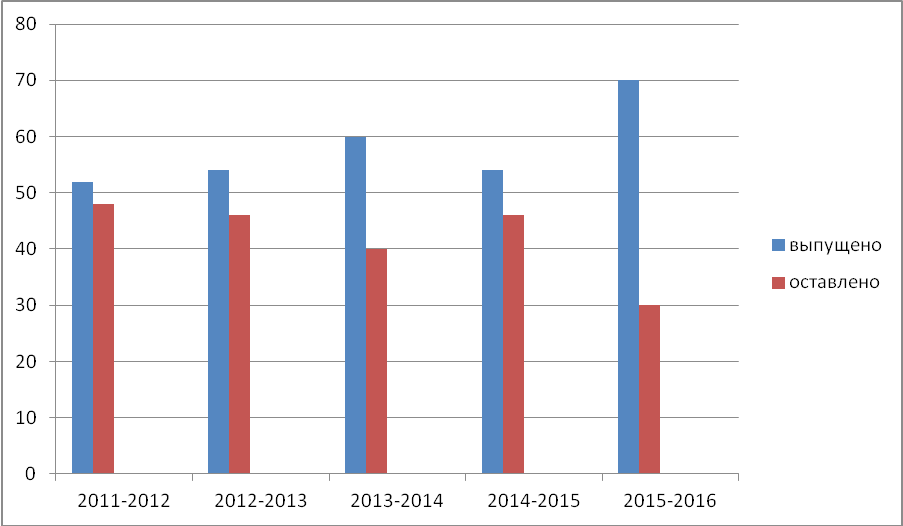
Decrease in the number of released children in 2014-2015 academic year. due to the admission to the boarding school, mainly in grades 4-7, a large number of pedagogically neglected students with a general underdevelopment of speech. The bulk of newly enrolled pupils have significant gaps in knowledge of the Russian language, combined with various types of dysgraphia and dyslexia, and persistent negativism towards all types of education. When planning speech therapy work with such children, I make extensive use of all the opportunities provided by information and communication technologies. This work has yielded positive results. According to an anonymous survey of younger teenagers who have just entered a boarding school, they are most interested in classes using ICT, and information presented in an interactive form is remembered for a long time. There is also a decrease in negativism towards speech therapy classes.
In parallel with the quantitative assessment of speech therapy activities, a qualitative analysis of the results of correctional and developmental work at the speech center is carried out.
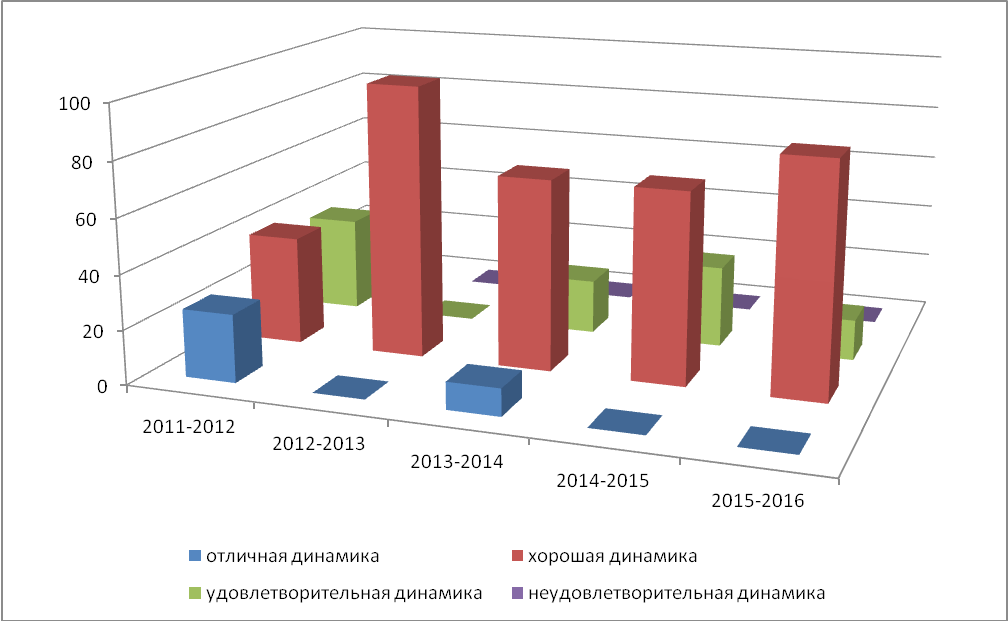
Excellent dynamics implies excellent academic performance in the Russian language, good - respectively - academic performance for a grade of "4" and satisfactory for a "3".
Result of work:
Generalization of experience on this topic at the regional competition "My vocation is a speech therapist" (2013);
Creation of a personal website (2013);
Training at advanced training courses "ICT in professional activity" (2013);
holding mmaster class "Creation and expediency of using multimedia presentations in speech therapy classes" at the RMO of speech therapist teachers in the Kireevsky district (2014);
Publication of the article "The feasibility of using ICT in speech therapy classes" (2013);
Implementation of the long-term project "Selected Works" (since 2011); the project is the winner of the International Pedagogical Creative OlympiadPEDOLIMP"Project and research activities (elementary school)" (2015).
The use of modular training in speech therapy classes
Target: overcoming educational difficulties in children with speech disorders through the formation and development of learning skills.
Relevance: According to psychological research, there has recently been an increase in the number of children experiencing difficulties in mastering the school curriculum.
Modular training offered by a group of speech therapists from St. Petersburg (Mettus E.V., Litvina A.V., Turta O.S., Burina E.D., Ivanova T.A., Ivanova O.V., Konyukhova E.V.), allows you to overcome learning difficulties through the formation and development of learning skills. This program includes 6 modules:
Ability to correctly perceive verbal or written instructions;
Ability to plan actions to complete the task;
Ability to exercise final self-control;
The ability to independently evaluate the results of their activities;
The ability to arbitrarily manage their attention and pace of activity;
Ability to communicate in a learning situation.
Result of work:
There has been a positive trend in the formation of educational skills among different categories of pupils (children began to better navigate the learning situation, plan their actions to perform various tasks, students acquired the ability to arbitrarily regulate their attention, switch in a timely manner when changing activities, exercise self-control);
According to the results of a psychological study (May 2016), 40% of children attending speech therapy classes showed adequate self-esteem (compared to 2012, adequate self-esteem was observed in 25% of children), i.e. students have learned to recognize the strengths and weaknesses of themselves as a student;
The technology of modular training is described in detail by me and posted on my personal website for public review (2013);
Development of technology for the resulting scoring (accumulation of points for work in class);
Application of Dalton plan technology within the framework of the Selected Works project (development of a plan and deadlines for the implementation of independent work).
Analytical activity
Target: identifying the dynamics of children's speech development, tracking the effectiveness of the applied speech therapy technologies.
Relevance: tracking the dynamics of the speech development of children attending speech therapy classes is necessary in order to draw a conclusion about the effectiveness of the use of certain correctional and developmental technologies and the appropriateness of their use in speech therapy practice.
Result of work:
Studying the data of the medical, psychological and pedagogical examination of the child and comparing this information with the results of speech therapy diagnostics to compile a complete picture of existing disorders, identify the main causes of lag in speech development;
Presentation of analytical reports on the dynamics of the speech development of children at meetings of the school council;
Preparation of analytical reports on the work done;
Development of a strategy for corrective impact on each child together with psychologists, social educators, teachers, educators and doctors;
Development of correctional and developmental programs based on analytical data:
The program of speech therapy support for students with impaired oral and written speech (grades 1-7)
The program for the development of intellectual abilities of younger schoolchildren using the resources of computer stands "Wildlife"
Program for the development of higher mental functions for children of primary and secondary school age with learning difficulties
Health saving program in speech therapy classes
Thus, ensuring the organizational, content, methodological components of the speech therapy process, as well as the interconnected efforts of teachers to eliminate the speech pathology that children have, allows us to achieve the main goal of any educational institution, which isin the organization of work on the integrated development of children through the creation of a single educational space, the implementation of an integrated approach in the pedagogical process.
I believe that the main goal of my activity is achieved. In the future, I plan to build my work based on the goals and objectives:
Target speech therapy support - the formation of communication skills in children, skills of educational activities and the correct distribution of time, planning their actions and self-control.
Tasks:
development to the required level of psychophysical functions: articulatory apparatus, phonemic hearing, small muscles of the hand, optical-spatial orientation, hand-eye coordination, etc.;
enrichment of the horizons of children, the formation of distinct versatile ideas about objects and phenomena of the surrounding reality, which will allow them to perceive educational material consciously;
the formation of social and moral behavior (a responsible attitude to speech therapy classes, compliance with the rules of behavior in the classroom, rules of communication, etc.);
development of personal components of cognitive activity (cognitive activity, independence), overcoming the intellectual passivity characteristic of children brought up in a boarding school;
the formation of skills and abilities necessary for activities of any kind: the ability to navigate the task, plan the upcoming work, perform it in accordance with a visual model and (or) verbal instructions of a speech therapist, exercise self-control and self-assessment;
formation of age-appropriate general intellectual skills (operations of analysis, comparison, generalization, practical grouping, logical classification, inference, etc.);
increasing the level of general development of schoolchildren and correcting individual deviations in development (taking into account the pace of activity, readiness to assimilate new educational material, etc.);
protection and strengthening of the somatic and psycho-neurological health of children: prevention of psychophysical overload, emotional breakdowns, creation of a climate of psychological comfort, ensuring the success of educational activities in its frontal and individual forms.
I will also continue to search for new effective techniques and methods of speech therapy.

